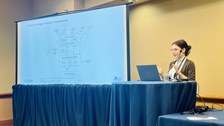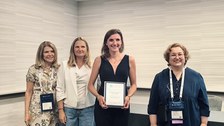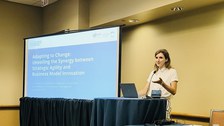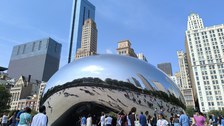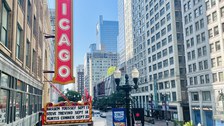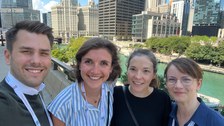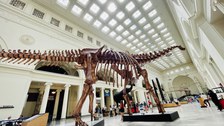Presentation of student research and Best Paper Award at AOM in Chicago
The 84th Annual Meeting of the Academy of Management (AOM) took place from August 9 to 13, 2024 in Chicago, Illinois, USA. Sarah Müller-Sägebrecht and Laura Melzer from the Chair of Entrepreneurship and Innovation took part in AOM 2024 and report on their experiences in the following interview. For Laura, who studies Business Administration, this was her first conference visit, where she was able to present the paper based on her bachelor thesis. Sarah was a co-author of this paper and also received the Student Best Paper Award for a paper with Isabell Lippert (Chair of Business Information Systems, esp. Business Engineering). In the interview conducted by Uta Schwarz and Johanna Grillmeyer, they talk about their experiences at AOM and in Chicago.
Please start by briefly introducing yourselves.
Laura: I'm Laura, 23 years old and I'm studying for a Master's degree in Business Administration here at the faculty, specializing in Learning and Human Resources Management, Management and Marketing and Business Information Systems. I'm starting my third semester in the winter term. Before that, I completed my Bachelor's degree in Business Administration and Economics and was already working as a SHK at the Chair of Entrepreneurship and Innovation at the time. Since last year, I have also been working as a student trainee in project controlling at an IT company.
Sarah: I am 35 years old, have 2 children and work as a Research Associate at the Chair of Entrepreneurship and Innovation. I supervise several lectures, seminars and theses there. Before that, I studied Industrial Engineering and Management at TU Dresden. Today, I am doing my doctorate on the subject of business model innovation and will be submitting my doctoral thesis in the coming weeks.
Please tell us why you attended the Academy of Management (AOM) conference in Chicago together this year.
Laura: Together with Sarah and Herbert Nold from Polk State College (California, USA), we wrote a paper based on my Bachelor's thesis, which was accepted at the AOM and presented in Chicago by myself and Sarah. I am very happy that I was able to travel to the AOM together with Sarah and get a taste of international conferences for the first time.
Sarah: I had several reasons to go to AOM. Firstly, I presented two papers - the paper I wrote with Laura and an article that I wrote together with Isabell Lippert from the Chair of Business Information Systems, esp. Business Engineering. In the article, we reported on how we used ChatGPT for the first time with our students in the "Technologie und Gründung" seminar and what consequences we see for teaching in the future. We received the Student Best Paper Award for this from the Academy of Management, which I was able to accept at a ceremony in Chicago. That was my absolute highlight of the conference and the highlight of my doctoral studies.
On the other hand, I held a Professional Development Workshop for the first time with colleagues from RWTH Aachen, St. Gallen and Bern University of Applied Sciences, in which we reported on our experiences, tips and tricks in the use of ChatGPT and other language models in teaching. It was a really exciting collaboration. I will be integrating a lot of this into my seminars in the coming semester, it will be exciting, I can already reveal that much...
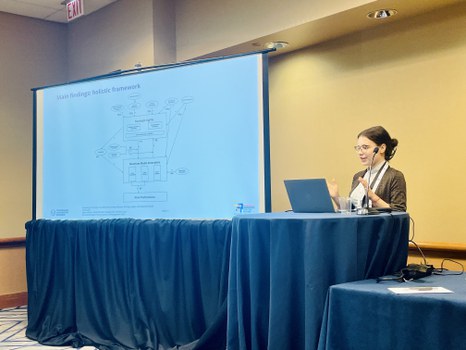
© Laura Melzer
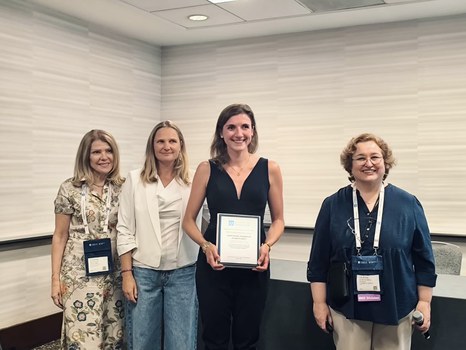
© Sarah Müller-Sägebrecht
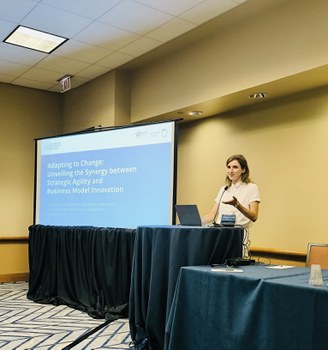
© Laura Melzer
What is the content of the Bachelor's thesis or paper about? And how was the process from the Bachelor's thesis to the successful publication?
Laura: It's about the concepts of business model innovation and strategic agility, which we combined for the first time in our paper.
Sarah: Laura had written a very good Bachelor's thesis that was already at Master's level. I can recognize really good theses by the quality and depth of content of the illustrations produced, as there is an intensive cognitive process behind them. In her thesis, Laura created a theoretical model based on a systematic literature analysis, which you have to understand in depth in order to be able to visualize it as Laura did. I knew right from the start that Laura's work was an exciting topic with gaps in research, as I already had the calls for proposals for suitable conferences in mind. However, I only asked Laura whether we wanted to turn the Bachelor's thesis into a publication after it had been submitted and assessed.
Laura: After submitting my bachelor's thesis, we turned it into a paper bit by bit, from October last year to submission in January 2024. We were also supported by Herbert Nold, a native speaker who was responsible for the final polish of the language. Sarah met him last year at the EURAM conference in Dublin.
Laura, it was your first time at the AOM. Was it everything you thought it would be? And what are your recommendations for other students who would also like to go to a conference?
Laura: Mmh, very good question. I already knew that I would meet a lot of experienced scientists there. So I was very nervous and also unsure whether I wanted to come at all. On top of that, the conference fell at a time when I was also due to write an exam. Unfortunately, it was not possible to make up the exam on a single date, so I was unsure about the threat of exceeding the standard period of study. In the end, encouraged by Sarah and my family, I decided to fly to Chicago and postpone the exam.
I really enjoyed the workshops at the beginning of the conference week. I had imagined everything to be more strict and formal, but all the people I met were very open and relaxed and the topics were really interesting and varied. In some cases, I heard eight presentations in one day and was able to gather ideas for my Master's thesis.
Students who would also like to take part in a conference should definitely have the right supervisor. The supervisor must already have it on their radar that more can come out of a thesis and consider it possible to get a student this far. Accepting feedback is important and sticking with it. You should also have intrinsic motivation. I consider it a great privilege to be able to receive an extended education.
Sarah, how do you see it? What are your recommendations for students who would also like to attend a conference?
Sarah: If you want to achieve more than the average, you have to give more. As a student, you don't just come to the AOM, it's absolutely not a matter of course. I can only confirm that students should accept feedback. I prefer to work together with students who I give feedback to and who report directly the next time how they have implemented the feedback. And from my perspective, there are 2 fundamental things that are needed: Diligence and discipline. If I have these two strengths, I can go far - before, during and after my studies. My students can ask me as many questions as they want, which shows that they are interested. What I can't stand is when they don't take their studies seriously and somehow expect us to carry them through the finish line as Research Associates. Then it doesn't work out with a conference either.
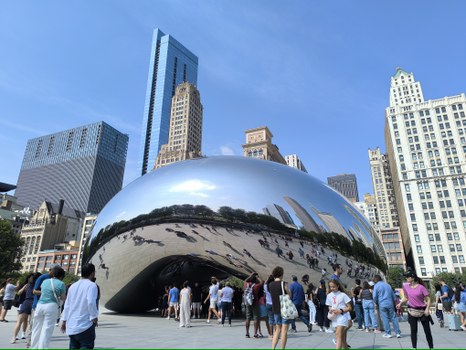
© Laura Melzer
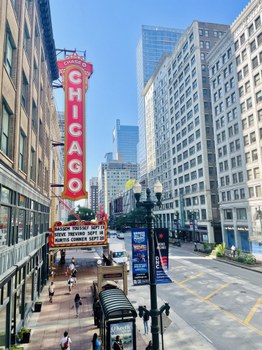
© Sarah Müller-Sägebrecht
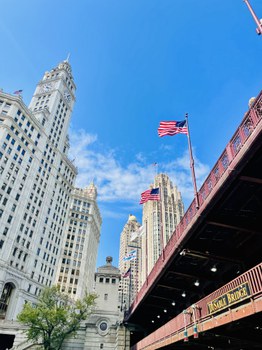
© Sarah Müller-Sägebrecht
US: Of course, a conference trip like this also costs money. Can you say something about the financing of your stay?
Laura: I paid for everything completely out of my own pocket, as unfortunately we haven't been able to find suitable funding for student conference visits at TU Dresden so far. However, I'm currently applying to a few pots and hope to receive financial support later on.
Sarah: I received a travel award from the Graduate Academy. I had three conference acceptances this year, but was only able to travel to the AOM due to a lack of funding, which is unfortunate. Personally, it would also be important to me if we could create more financial incentives for students so that we can promote excellent achievements like Laura's in a targeted manner.
What are your key take-aways from your stay at the AOM?
Laura: In a nutshell: you should take advantage of opportunities that open up to you. And anything is possible!
Sarah: I am an absolute fan of AOM in general! Attending this conference helps me to get a feel for hot topics and learn a lot in a short space of time. The networking opportunities are great, both on site and digitally. In the meantime, I feel much more confident about contacting renowned researchers on LinkedIn etc.
What was your personal highlight in Chicago?
Laura: The city center was really beautiful, I didn't expect that at all. We also went on a boat tour and learned a lot about architectural history. That was interesting and relaxing at the end of the conference after everything was done. I also went to a concert by my favorite band that played in Chicago without knowing it beforehand. The concert was also on the evening before the presentation.
Sarah: I was totally surprised at how green and beautiful Chicago is. The natural River Walk is just great and the Field Museum of Natural History. Going there was a spontaneous idea, Laura and I ended up spending five hours in the museum.
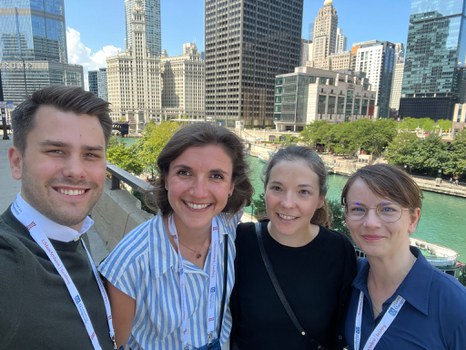
© Sarah Müller-Sägebrecht
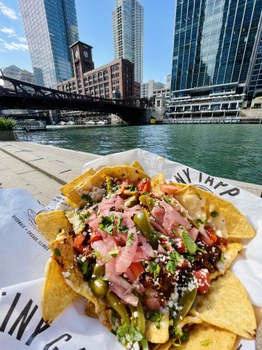
© Sarah Müller-Sägebrecht
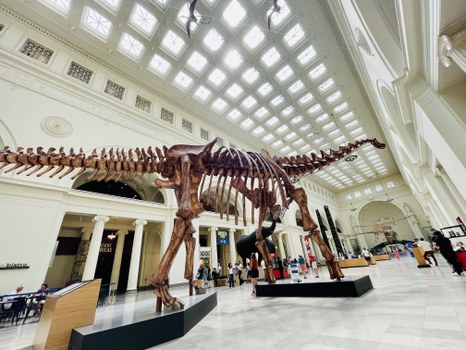
© Sarah Müller-Sägebrecht
Thank you very much for the exciting insights and good luck with your research, teaching and studies!


